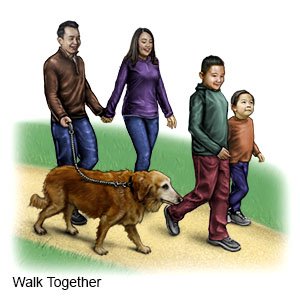Depressive Disorder in Children
Medically reviewed by Drugs.com. Last updated on Aug 4, 2025.
What is a depressive disorder?
A depressive disorder is a medical condition. It is normal for your child to feel sad, irritable, or hopeless sometimes. A depressive disorder is a condition that causes your child to have these feelings for weeks, months, or longer. Your child's feelings may interfere with his or her normal activities. Do not wait for your child's feelings to go away. A depressive disorder can be treated.
What are common signs and symptoms of depressive disorder?
Signs of a depressive disorder are seen almost daily. Your child may have any of the following:
- Change in appetite, weight loss, or weight gain
- Too much sleep or not enough, or waking earlier than usual without going back to sleep
- Irritable or angry mood, restlessness, or anxiety
- Lack of interest and concentration in enjoyable activities and schoolwork
- Low energy or fatigue, or seeming withdrawn from family and friends
- Feelings of guilt and worthlessness
What increases my child's risk for a depressive disorder?
- Stressful events such as the death of a loved one, abuse, parents' divorce, or loss of a friendship
- Parents, siblings, or other family members with a history of depression
- An anxiety disorder, ADHD, or a learning disability
- Low self-esteem or poor relationships with others
- Being bullied
- Drug or alcohol use
How is a depressive disorder diagnosed?
Your child's healthcare provider will ask about signs that you or others, such as teachers, have noticed. Tell your child's healthcare provider how long you have noticed the signs. The provider will ask if any family members have depression. Tell the provider about any stressful events in your child's life. The provider may ask about your child's other health conditions or medicines your child takes. The provider may ask how the symptoms are affecting your child's relationships at home, school, or work.
How is a depressive disorder treated?
Your child's healthcare provider will help you and your child develop a treatment plan. The provider will ask your child to make plans for coping at home, school, work, and around friends. The plan may include an emergency contact in case your child feels like hurting himself or herself, or others. It may also include regular exercise, good nutrition, and any of the following:
- Mental health therapies may include the following:
- Cognitive behavioral therapy (CBT) helps your child create more realistic, appropriate thoughts about his or her behaviors and self. Your child may work individually with a mental health provider. CBT may also be done with a group of children that have a depressive disorder. CBT may be combined with medicines that help treat your child's depressive disorder.
- Interpersonal therapy (IPT) helps your child connect to other people by understanding other's feelings and views. IPT also helps your child communicate better with friends and family members.
- Antidepressant medicine may be given to improve or balance your child's mood. Your child may need to take this medicine for several weeks before he or she begins to feel better. Tell your child's healthcare provider about any side effects or problems your child has with the medicine. The type or amount of medicine may need to be changed.
What can I do to help my child?
- Talk to your child about his or her mood. Your child may ignore you or deny that anything is wrong. Keep trying.
- Be patient with your child. Do not become angry because of your child's irritable or grumpy mood.
- Spend time with your child. Play a game, watch a movie, cook, or make a craft with your child. Encourage positive moods, enjoyment, and relaxation in your child by spending time with him or her.
- Take your child to all appointments. A depressive disorder is treatable with the correct help. Your child can feel better with treatment.
- Encourage healthy eating and sleeping habits. Make sure your child eats a variety of healthy foods. Stick to a sleep schedule so he or she gets enough sleep. Your child may sleep better if his or her room is quiet and dark.

- Make sure your child gets 1 hour of physical activity every day. Encourage your child to play sports or be active every day. You and your child can take a walk. Physical activity can reduce symptoms of depression.

Call your local emergency number (911 in the US) for any of the following:
- Your child has done something on purpose to hurt himself or herself.
- Your child talks about or attempts suicide.
When should I call my child's therapist or doctor?
- Your child's symptoms do not improve.
- You cannot take your child to his or her next appointment.
- Your child has new symptoms.
- You have questions or concerns about your child's condition or care.
Care Agreement
You have the right to help plan your child's care. Learn about your child's health condition and how it may be treated. Discuss treatment options with your child's healthcare providers to decide what care you want for your child. The above information is an educational aid only. It is not intended as medical advice for individual conditions or treatments. Talk to your doctor, nurse or pharmacist before following any medical regimen to see if it is safe and effective for you.© Copyright Merative 2025 Information is for End User's use only and may not be sold, redistributed or otherwise used for commercial purposes.
Further information
Always consult your healthcare provider to ensure the information displayed on this page applies to your personal circumstances.
